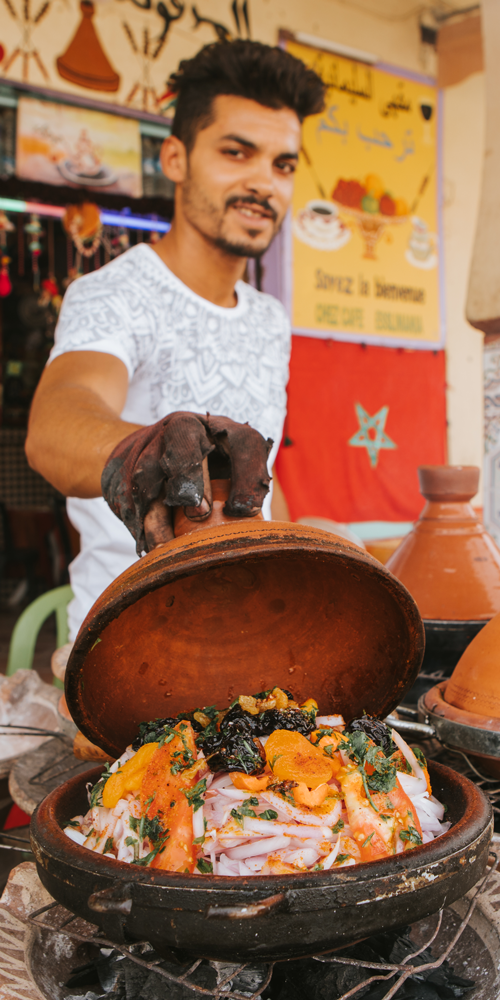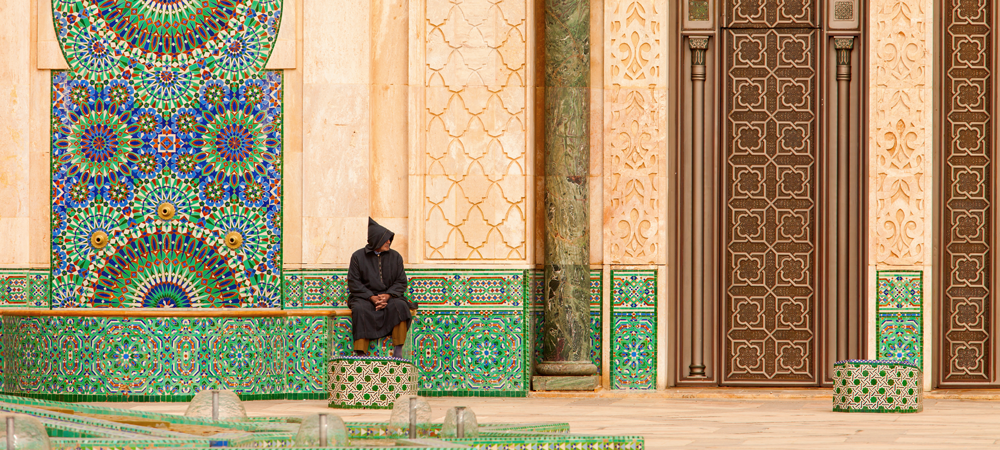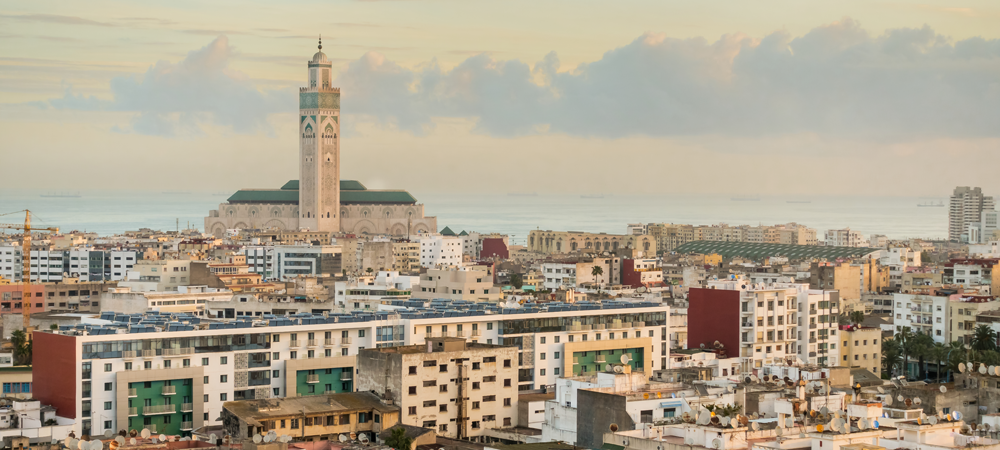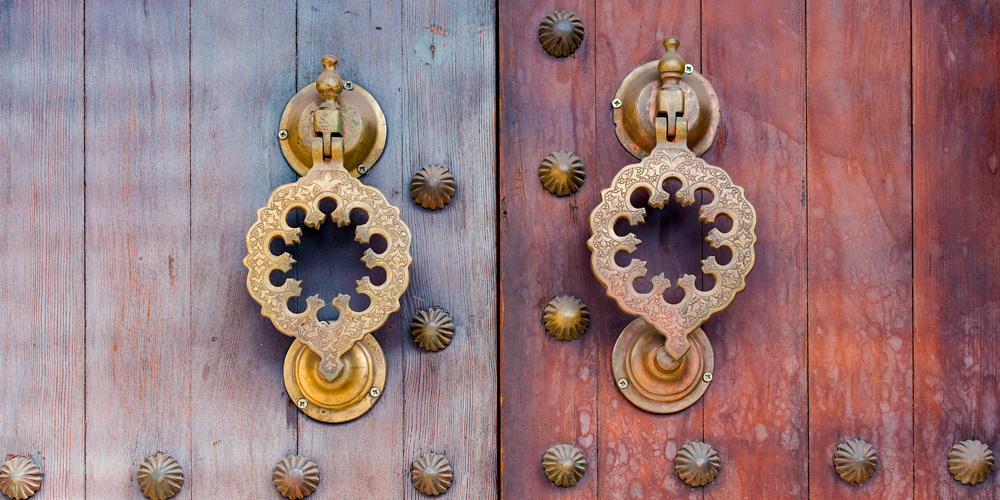In This City is a challenge to journey with us in prayer for 12 key cities in 2020. We ask you to commit to praying for fruit that will ripen and bear the seeds for mature, vibrant, and multiplying churches across the Arab world.
Introduction
Having spent a month praying for Mardin, we head now to the western edge of the Arab world. Our city meets the Atlantic shore and is considered the business capital of Morocco. ‘Here’s looking at you, kid….’ It’s Casablanca.
Casablanca inherited its name from Spanish and Portuguese influence. Previously known as Anfa, it is now the only metropolis in Morocco with a non-Arab name.
As highlighted by Humphrey Bogart’s infamous quip, many people have a romanticised idea of the city (though admittedly, there is a Rick’s Café in the heart of the city). Today the real Casablanca is at the forefront of modern Morocco. Consequently, tourists tend to be drawn more to the souks of Marrakesh or the tanners of Fes than to the bustling epicentre of trade. But Casablanca isn’t without its hidden gems, and there’s plenty of culture and history to be experienced here with the help of a guide. Diving below the business trade surface, you’ll experience the fascinating blend of French Art Deco architecture alongside the ancient passageways of the medina, intertwining with museums and palaces. You’ll also discover the world’s second-largest mosque towering over the water. Its tallest minaret stands at 210 metres (690 feet) and is topped with lasers pointing to Mecca!

 About Casablanca
About Casablanca
Population: 4 million (said to swell to 10 million during the workday)
Languages: Arabic, Berber, French
Religion: Muslim 99%, Christian 0.9% (primarily French Catholics), other 0.1%
Ethnic groups: Mainly Arab and Berber. A significant percentage of Europeans and Asians in the commercial centres. Years ago, Casablanca had a sizeable Jewish community. In 2012, it was estimated that only 2,000–2,500 Jews still lived in Morocco, mainly in Casablanca. Most had emigrated to France, Canada, or Israel.
Geographical size: 220 km² | 80 mi²
Location: Central, West Morocco
Key historical events:
- Founded as part of the Berber Kingdom of Barghawata in 744 AD. It was used as a port by the Phoenicians and later by the Romans. The town and the medina of Casablanca as it is today was founded in 1770 AD.
- In the nineteenth century, Casablanca progressed by trading with Europe, until France’s invasion at the beginning of the twentieth century.
- In the 1920s, as part of the French Protectorate, Casablanca expanded into a metropolis of 100,000. A French service leader, motivated by his admiration of the port of Marseille, started a monstrous task of reconstruction. Half a century later, Casablanca and its offices surpassed those of Marseille.
- During World War II, while Nazi Germany controlled Casablanca, America invaded and took control over its port as part of Operation Torch.
- During the 1940s and 1950s, Casablanca was a major centre of anti-French rioting until Morocco gained independence from France in 1956.
- In March 2000, women’s groups organised demonstrations in Casablanca. The protests were attended by 40,000 women and called for a ban on polygamy and the introduction of divorce law (divorce being a purely religious procedure at that time). The movement influenced King Mohammed VI to enact a new Mudawana (family law) in early 2004. This met some of the demands of women’s rights activists.

Challenges
People
The general populace is similar to those of most megacities. Opportunities abound for the ambitious and privileged, and hardship plagues many others who cannot keep up with the pace of big city life. In between, the majority waft in and out of failure and success, clinging to faith in the state religion that seems to provide needed moral support. If driving is a metaphor for life here, then most are resigned to letting the taxi drivers transport them through the congested streets.
The class system profoundly impacts all areas of life. The government boasts free healthcare, but the system struggles to provide for the poorest Moroccans and migrants. At the same time, private healthcare provides big business, giving first-class treatment to those who can afford it. Racism is prevalent, even though the law guarantees basic human rights. In this diverse city, religious fervour exerts its influence across the spectrum. The majority have a general sense of apathy for religion, except in the presence of foreigners, where the appearance of being a devout Muslim is important.
Seekers
The people of Casablanca tend to be more moderate than other Moroccans because of the visible presence of foreigners and foreign-run businesses. People of Casablanca tend to dress more western, often to fit in with their international workplace. Still, an evident mix of western and traditional garb is a common sight. The pressure to conform to Islamic norms of dress and ritual tends to be less for those earning a good income for the family. With that good income comes better access to outside ways of thinking through media. Due to the growing availability of smartphones and VPNs, private web surfing has made it safer for Moroccans to venture into taboo sites, including Christian ones. This is a new opportunity for the local church to engage in private dialogue with seekers in a country where persecution is severe for those who openly break from Islam to embrace Christianity.
Team
By the grace of God, Casablanca has a handful of established underground local churches. However, severe persecution limits them from reaching out openly. Local church leaders welcome expatriate workers to partner with them in reaching into closed communities. The goal is always to connect seekers to local believers to limit dependence on foreigners. In this megacity, multiple teams are at work and seeking an increasingly closer collaboration to the glory of Christ.

Prayer points
- Casablanca is a challenging place to share the gospel. There is a resistance to the Good News since it is seen as a westernising or foreign faith that undermines the local ways of life. It is easier to remain conformed to the Islamic culture. Materialism and secularism are also a real draw and less controversial than Christianity. Pray for breakthrough in people’s hearts and minds.
- Local believers are generally fearful, and it is difficult for our team to have face to face interactions for security reasons. We’ve seen more boldness from some recently and are excited to see what the Lord will do. Pray against fear and for a spirit of greater peace and courage.
- Local believers who are open about their faith tend to struggle with consistent employment due to persecution. Pray for provision for them in a way that does not lead to foreign dependence.
- There are now discipleship resources for the few interested seekers, but it can be risky to put them into their hands without being accused of proselytism. Pray that our innovative media ministry will continue to challenge hearts and that God will facilitate opportunities for much-needed resources to be delivered to the community.
- Pray for wisdom and open doors for members of the PI teams. Also, pray for continued healthy team life. More long-term members are needed to increase our effectiveness and outreach in this city. Pray for times of refreshing and re-energising from the Lord, and that he will call more people with the right skills to join the team.
One more thing…
Our team members have encouraged us to pray 2 Corinthians 3:14–18 over Casablanca. We long to see the veil removed from the hearts of unbelievers here so they would know the truth, see his glory, and be transformed.
Thank you for praying with us
Next month, we’ll be praying for Mecca, Saudi Arabia.
